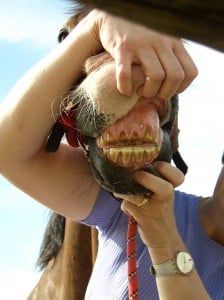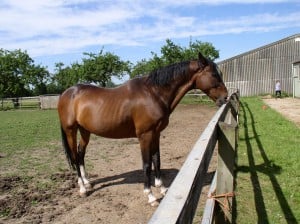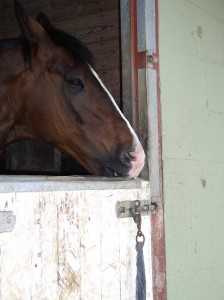Crib-biting and windsucking used to be called stable vices, but as horses are increasingly studied we understand more about the motivation behind these behaviours, and they have been renamed as oral stereotypies. These ‘habits’ are defined as “repetitive behaviours induced by frustration, repeated attempts to cope, or central nervous system dysfunction” and have no obvious function for the horse.
Why does it happen? Research has shown horses that perform oral stereotypies have altered function in nerve cells within the brain. These changes are due to stress. It seems that horses have an inbuilt need to satisfy certain factors that would occur in a natural environment, such as freedom of movement, and constant access to forage. If their domestic environment is inadequate in these areas it can often result in an excessive build-up of acid in the stomach, resulting in pain, which then causes stress, which can lead to a stereotypy occurring. Over time if the situation is not changed and the problem not addressed the horse's ‘need’ may become performing the stereotypy itself and the habit gets harder to break. By controlling the environment and diet of horses and ponies that crib-bite or windsuck you can lower the excess acid in the stomach, and reduce the occurrence of the oral stereotypies.  So why is it a bad thing? Horses that crib bite (where they grasp an object with their front teeth, contracting neck muscles, drawing in air and grunting) or wind suck (same action without grasping something physical) can harm their own health, leading to bad teeth and weight loss. It can also result in horses not being welcome on some stable yards, and the horse’s monetary value drops as these very common traits are seen as undesirable, despite an estimated 10-20% of horses performing oral stereotypies.
So why is it a bad thing? Horses that crib bite (where they grasp an object with their front teeth, contracting neck muscles, drawing in air and grunting) or wind suck (same action without grasping something physical) can harm their own health, leading to bad teeth and weight loss. It can also result in horses not being welcome on some stable yards, and the horse’s monetary value drops as these very common traits are seen as undesirable, despite an estimated 10-20% of horses performing oral stereotypies.  What can I do about it? It used to be that they thought nothing could help with these problems, or owners would use foul smelling liquids or cribbing collars to deter the horse. Rather than stopping the motivation for the horse to perform the stereotypy, this action will physically stop the horse, often resulting in an upset, stressed horse and more problems. By targeting the problem at its root, you can help your horse to lose the desire to perform the stereotypy by providing them with a good routine and diet, and by supplementing their feeds with Settelex, which has been shown to reduce crib-biting and windsucking. When are stereotypies more likely to develop?
What can I do about it? It used to be that they thought nothing could help with these problems, or owners would use foul smelling liquids or cribbing collars to deter the horse. Rather than stopping the motivation for the horse to perform the stereotypy, this action will physically stop the horse, often resulting in an upset, stressed horse and more problems. By targeting the problem at its root, you can help your horse to lose the desire to perform the stereotypy by providing them with a good routine and diet, and by supplementing their feeds with Settelex, which has been shown to reduce crib-biting and windsucking. When are stereotypies more likely to develop?
- When horses have little or no turnout
- When horses have high cereal diets
- When horses don’t receive enough forage
- When horses exercise intensively
- When foals are weaned abruptly
- Provide adequate forage- ideally ad-lib, but if your horse needs restricted feeding, ensure that they are trickle fed, receiving forage little and often
- Feed as few high starch feeds as possible
- Maximise turnout
- Give your horse a varied work schedule
- Make sure your horse has equine company- if they need to be stabled it is beneficial to see another horse!
- Feed Settelex to minimise excessive acid within the stomach
Olivia Colton MSc - Feedmark Nutritionist 0800 585525


